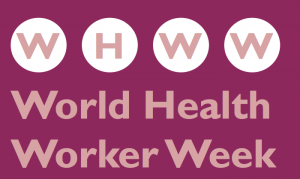World Health Worker Week: Join the Call to Action

It’s World Health Worker Week (WHWW)! WHWW was started two years ago to celebrate and call attention to the inspiring health workers across the globe who make health care a possibility. In addition to recognizing the important work of health workers, including community health workers (CHWs), this week is a time for advocating for human resources for universal health coverage (UHC). This year holds extra significance, now that the post-2015 development agenda is being defined.
Recognizing this, the Frontline Health Workers Coalition, the Global Health Workforce Alliance and the Health Workforce Advocacy Initiative have authored a joint statement (below) that recognizes health workers and puts forth a call to action for the global community. As an active member of FHWC, 1mCHW Campaign endorses this statement and would like to remind readers that CHWs are an integral part of the health workforce and a necessity in the sprint to achieve the health Millennium Development Goals (MDGs) by 2015 – and beyond.
Continue the conversation and celebrate CHWs and other health workers by following #WHWWeek and #healthworkerscount.
Joint World Health Worker Week Statement by the Frontline Health Workers Coalition, Global Health Workforce Alliance, Health Workforce Advocacy Initiative
Every year on April 7, people from around the world celebrate World Health Day, designed to mark the anniversary of the World Health Organization, established in 1948, and to call attention to global health priorities. For the past two years, this day also has marked the start of World Health Worker Week, a weeklong celebration of the inspiring health workers who make health care possible.
From risking their lives to quell an Ebola outbreak in Guinea or to stamp out polio in Pakistan to delivering millions of healthy babies from healthy mothers, health workers protect us, inspire us and enable us to thrive. Health workers have been central to the remarkable progress we have seen in global health in recent decades – including eliminating smallpox, putting polio on the brink of eradication and, since 1990, slashing annual early childhood deaths in half.
Bold new targets have been set to end preventable maternal, newborn and child deaths, eliminate mother-to-child transmission of HIV and usher in an AIDS-free generation, eliminate tuberculosis and malaria as major killers, achieve universal access to family planning, and to ensure universal health coverage. Renewed global and developing country commitments have been made to achieve these targets. However, a severe lack of trained and supported health workers, especially on the frontlines in the world’s hardest-to-reach areas, stands as a major hurdle to achieving this vision in the coming decades.
The Global Health Workforce Alliance and the World Health Organization estimate the world is short at least 7.2 million doctors, nurses and midwives needed to provide essential health services – a shortage that could climb to 12.9 million by 2035[1] if we do not focus on building the health workforce we need for the 21st century. Thankfully, leaders around the world have committed to putting an end to this crisis.
In November 2013 at the Third Global Forum on Human Resources for Health in Brazil, WHO member states in the Recife Declaration committed to “an ambitious agenda for health workforce development at all levels, in particular at country level,” working toward a shared vision that “all people, everywhere have access to a skilled, motivated health worker, within a robust health system.” Fifty-five WHO member states and 27 other constituencies in Recife made concrete commitments toward achieving this vision.
We need to ensure strong and swift implementation of these commitments, backed by sufficient resources and clear health workforce targets included within the post-2015 global development framework. Health workers must also be better equipped and trained; we must make investments in their security, social and economic welfare; and countries must abide by the WHO Code of Practice for Health Worker Migration.
During this World Health Worker Week, we resolve to work together to listen to, support and honor health workers throughout the year, ensuring their contributions to healthy and prosperous societies are recognized and celebrated.
[1] A Universal Truth: No Health Without a Workforce, 2013

Comments are closed